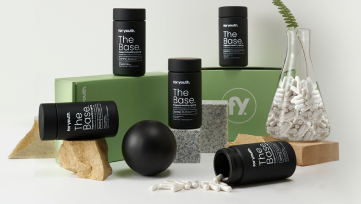The Power Of Quercetin: An Antioxidant For Health And Wellness


 Shop our Quercetin
Shop our Quercetin 
Quercetin, a potent antioxidant found in various fruits and vegetables, holds significant potential in promoting health and wellness. This article explores the power of quercetin as an antioxidant and its role in improving overall well-being.
Quercetin can be obtained through supplementation or by consuming quercetin-rich foods, with yellow onions being the highest source. Other sources include apples, grapes, berries, peppers, nuts, broccoli, and tea. However, it is worth noting that cooking or processing these foods may reduce the quercetin content.
Quercetin’s influence on health doesn’t stop at chronic illnesses. Recent studies reveal its significant role in eye health and vision support, showing its promising potential in preventing vision degradation. Adding quercetin to your daily health regimen might not only promote your overall well-being but also reinforce your body’s defenses. Thanks to its properties, it can potentially aid in boosting your immune system. Choosing the right quercetin supplement could optimize these health effects but remember to consult with a healthcare professional before implementing any new supplement. Pairing quercetin with zinc elevates its properties to another level in what is referred to as the ultimate combo for combating oxidative stress and inflammation. Don’t miss out on quercetin’s benefits, arguably the super antioxidant you need in your life.
As part of the flavonoid group of antioxidants, quercetin can scavenge free radicals and counter oxidative stress. Its potential therapeutic applications include the treatment of Alzheimer’s disease, cancer, cardiovascular diseases, arthritis, and type 2 diabetes. Nevertheless, it is crucial to consult with a healthcare professional before making any decisions regarding diagnosis or treatment.
By signing up, you consent to receive For Youth emails
Get The Latest On Longevity Delivered To Your Inbox.
Pregnant women and older patients should exercise caution and avoid quercetin supplements. Overall, quercetin represents a promising avenue for enhancing health and wellness.
Conclusively, quercetin’s potential is yet to be fully explored but what is known presents it as a potent player in health and wellness. The antioxidant is enriched with benefits that not only bolster regular body functions but also combat several ailments, thereby playing a significant role in enhancing overall health. You can read more about the power of quercetin and its various potentials. However, do remember to consult with your healthcare provider before making any changes to your diet or supplement regimen.
Key Takeaways

- Quercetin is a potent antioxidant that can be obtained through supplementation or by consuming quercetin-rich foods.
- Yellow onions are the highest source of quercetin, followed by other fruits and vegetables such as apples, grapes, berries, peppers, nuts, broccoli, and tea.
- Cooking or processing these foods may reduce the amount of quercetin present, so it is advisable to consume them in their raw or minimally processed forms.
- Quercetin has potential therapeutic applications in various diseases such as Alzheimer’s disease, cancer, cardiovascular diseases, arthritis, and type 2 diabetes.
The Power of Quercetin: An Antioxidant for Health and Wellness
Quercetin, a potent antioxidant found in fruits and vegetables, has the potential to treat various diseases such as Alzheimer’s disease, cancer, cardiovascular diseases, arthritis, and type 2 diabetes. It is a flavonoid that belongs to a group of antioxidants known for its ability to scavenge free radicals and counter oxidative stress.
Quercetin can be obtained through supplementation or by consuming quercetin-rich foods such as onions, apples, grapes, berries, peppers, nuts, broccoli, and tea. Onions, particularly yellow onions, have the highest levels of quercetin among fruits and vegetables. However, genetic factors and storage conditions can affect the amount of quercetin present in onions. It is important to note that cooking or processing these foods may reduce the amount of quercetin.
Quercetin supplements are available in the form of pills or capsules, with a daily dose of 500 mg considered safe and effective. However, it is advisable to seek medical advice before making any decisions regarding diagnosis or treatment.
What is Quercetin?

 Shop our Quercetin
Shop our Quercetin 
Derived from fruits and vegetables, quercetin is a potent flavonoid compound with potential therapeutic applications in various diseases. Quercetin acts as a powerful antioxidant, scavenging free radicals and counteracting oxidative stress. This property makes it an essential component in the prevention and treatment of neurodegenerative diseases, such as Alzheimer’s disease, as well as autoimmune disorders. Quercetin can also contribute to cardiovascular health, reducing the risk of cardiovascular diseases.
To illustrate the abundance of quercetin-rich foods, imagine a colorful array of fruits and vegetables, including vibrant red and pink onions, juicy apples, plump grapes, and luscious berries. Picture a medley of peppers, nuts, and broccoli, all packed with this beneficial compound. Additionally, envision a warm cup of tea, brimming with the health-promoting effects of quercetin.
However, it is important to note that cooking or processing these foods can diminish the quercetin content. Hence, supplementation may be necessary to ensure an adequate intake of this antioxidant compound.
Food Sources of Quercetin
Fruits and vegetables, such as onions, apples, grapes, berries, peppers, nuts, broccoli, and tea, are rich sources of quercetin.
Among these, onions have the highest levels of quercetin, with yellow onions containing the highest content followed by red and pink onions. Onions have a total quercetin content of about 300 mg/kg. However, it is important to note that the amount of quercetin in onions can be influenced by genetic factors and storage conditions.
Other sources of quercetin include apples, grapes, berries, peppers, nuts, broccoli, and tea. It is worth mentioning that cooking or processing these foods can reduce the amount of quercetin present. Therefore, to maximize quercetin intake, it is advisable to consume these foods in their raw or minimally processed forms.
Quercetin by For Youth
⇒ The Zombie – Quercetin Singapore

Description:
Quercetin is a scientifically-backed, plant-based anti-aging supplement. The Quercetin Phytosome™ acts as both an antioxidant and senolytic, effectively targeting and eliminating senescent or “zombie” cells to promote a longer, healthier life. By removing these harmful cells, quercetin helps to reduce inflammation, alleviate allergy symptoms, strengthen the immune system, improve athletic performance, and address a variety of age-related issues.
Frequently Asked Questions
Can quercetin supplements interact with other medications?
Yes, quercetin supplements can potentially interact with other medications. It is important to consult with a healthcare professional before taking quercetin supplements, especially if you are currently taking any medications, to ensure safety and avoid any potential drug interactions.
How does quercetin help in the treatment of Alzheimer’s disease?
Quercetin has the potential to treat Alzheimer’s disease by scavenging free radicals, reducing oxidative stress, and inhibiting the formation of amyloid plaques. However, further research is needed to fully understand its mechanisms of action and its efficacy in clinical settings.
What are the potential side effects of consuming quercetin-rich foods?
The potential side effects of consuming quercetin-rich foods include stomach aches and headaches. Pregnant women and older patients should avoid quercetin supplements. Always seek medical advice before making any decisions regarding diagnosis or treatment.
Are there any specific storage conditions that can help preserve the quercetin content in onions?
Specific storage conditions that can help preserve the quercetin content in onions include storing them in a cool, dark place, avoiding exposure to light and heat, and minimizing the time between harvesting and consumption.
Is there a recommended daily intake of quercetin for individuals with cardiovascular diseases?
For individuals with cardiovascular diseases, there is no specific recommended daily intake for quercetin. However, a daily dose of 500 mg of quercetin is generally considered safe and effective for most individuals.
Last Word
The article comprehensively explores the notable health benefits of quercetin, a potent antioxidant primarily found in fruits and vegetables such as yellow onions, apples, grapes, berries, peppers, nuts, broccoli, and tea. It emphasizes the compound’s potential in promoting health and wellness, including its therapeutic applications in treating diseases such as Alzheimer’s, cancer, cardiovascular diseases, arthritis, and type 2 diabetes. The article, however, advises consulting a healthcare professional before starting any supplementation and cautions pregnant women and older individuals against the use of quercetin supplements.
Regarding Quercetin by For Youth’s product, The Zombie – Quercetin Singapore, it is framed as a plant-based, anti-aging supplement. It works as both an antioxidant and senolytic, helping to eliminate harmful “zombie” cells that can contribute to various age-related issues. The product is designed to reduce inflammation, alleviate allergy symptoms, strengthen the immune system, and improve athletic performance. As with the dietary intake of quercetin, it is advised to consult with health professionals before consuming this product to ensure safety and avoid potential interactions with other medications.








